高一英语Unit1Lesson1APerfectDay2教案北师大版
北师大高一必修一 Unit1 Lifestyle Lesson 1 A Perfect Day教学

北师大高一A Perfect Day教学设计和原创习题高一A Perfect Day教学设计教学设计之道:文本是一块布,教师需要智慧地为学生量体裁衣教学设计之术:选择文本核心线索即文眼,从整体到细节梳理再回到整体,抓大放小,切忌只见树木不见森林1.梳理文章内容第一篇:根据couch potato确定文眼是TV,所有问题围绕TV展开:1.How many TV sets does he have?TV in the bedroom,TV in the living room,portable TV2.How many kinds of TV programmes does he watch?Six.children’s programmes,movies,TV series,sport,news,play3.How long does he watch TV every day?For sixteen or seventeen hours4.What’s his wife’s attitude towards his watching TV?supportive--His wife not only makes money but also meals.第二篇:根据workaholic确定文眼是work,所有问题围绕work展开:1. What does he do for his work everyday?(underline and summarize)*attend meetings,*answer/make phone calls,*look at some documents,*do some paperwork.学生容易将answer some personal e-mails作为其工作内容!2. What’s his job?most probably a secretary3. What’s his family’s attitude towards his work?opposed--His family complains about it.2.情感教育升华:What exactly is “A Perfect Day”?注重学生批判性思维培养和情感价值人生观的教育,例如从社会主义核心价值观之家庭和谐的角度得出:The couch potato’s lifestyle is better than the workaholic’s.couch potato: We haven't got too much money, you know, but we are happy. workaholic: I seldom have time for fun and other activities with my family. My family complains about it.3.写作赏析:*如何描写对电视的痴迷?写作角度可以从拥有电视机数量之多、观看电视节目时间之长、观看电视节目种类之多等。
最新版北师大高一必修1Unit 1精品教案1 A Perfect Day

1 A Perfect DayObjectives■To discuss favourite TV programmes and daily activities.■To revise Present Simple and Present Continuous.■To read two texts in order to check predictions.■To read two texts for specific information.Resource usedGrammar Summary 1, TV guide from the previous week. Possible problems■Students may still omit the “s”from the third person singular Present Simple, e.g. “He sit ... .”■Students may omit the auxiliary in the Present Continuous,e.g. “He watching.”■Students may confuse the different functions of each tenseand use the wrong one, e.g. “I’m watching TV every evening.” instead of “I watch TV every evening.”BackgroundThe reading text, A Couch Potato, is based on a real personfrom Edinburgh.There are two BBC (British Broadcasting Corporation) television channels (BBC1 and BBC2) and three commercial TVchannels in the UK (ITV, Channel 4 and Channel 5). Many families also watch cable and satellite TV.Routes through the material■If you have time, students can report back to the class afterdoing Exercise 6, telling the class about their partners.Encourage each student to say four or five sentences abouttheir partner.ReadingBefore you startExercise 1■Bring in a TV guide for the previous week’s programmes on CCTV. Ask students which programmes they watched.■Ask students to look at the Key Words as you read out thenames of some of the programmes from the TV guide.■Students match the programmes with the key words.Key Wordssports programmes, the news, TV series, cartoons, gameshows, films, talk shows, music programmes■Students then discuss their favourite kinds of TV programmes and their least favourite kinds.■Students work out how many hours of TV they watched last week, and then report back to the class so that a survey can be made. Language Power: the Word Corner on page 55 practises TV vocabulary. Exercise 2■Use the pictures to elicit or present: couch, sofa, workaholic, paperwork, document.■Students work in pairs and predict what kind of lifestyle each man has by looking at the pictures and the titles. Elicit words to describe the lifestyle of each person in the picture.Useful vocabulary:A couch potato: couch potato, switch on/off, switch over, portable, remote control; workaholic: alarm clock, go off, take up, urgent matters, personal email, document, bored Read to learnExercise 3■Students skim the texts and check their predictions.■Students underline the required information about the two people while reading the texts.■Have students underline the useful words describing the two different。
最新北师大版高中英语必修一unit1 Lesson One A Perfect Day教案

Lesson One A Perfect Day教案制作人:郝俊勇Learning Aims for Students:Read the text A Perfect Day1.Guess the meaning of important words and phrases in the context: cartoon/complain/ switch/ portable /remote/ paperwork/ urgent/personal /document/ bored /talk show/ switch on/switch off/switch over/go off/ take up/be filled up 2.Solve some simple problems through fast-reading; Grasp the specific informationof the text through detailed-reading; Share opinions with others confidently through group activities.3.Set up a correct lifestyle.The Analysis of the Learning Material:1.The reading sections are the enlargement and extension of warming up. And theyembody the theme of the whole unit.2.The reading materials are long passages which contain some new words andphrases which are very difficult for students to understand.3.The structure of the passage is quite clear, according to the time clue.The Analysis of Students:1.Students easily get bored with long passages while reading with masses of words.2.As senior1 students, they still are not capable enough of catching the main ideaand obtaining detailed information of the passage through reading.Learning Important Points for Students:1.Be able to catch the main idea of each paragraph.2.Try to grasp the specific information of the text through activities.Learning the Difficult Point for Students:Develop the practical reading methods according to the class exercises. Learning Methods:Task-based learning method and competition between girls and boysLearning Aids:Multi-media and blackboardLearning Procedures:Step I Lead-inQ:Enjoy some kinds of TV programme.Q: Which programme have you watched?Use the key words to help you: sports programmes, the news , TV series, cartoons, game shows, films,talk shows, music programmeAppreciate some kinds of TV programme and point out what they are.(一起抢答啊!答对有奖)music programmes cartoonfilms sportsProgrammeTV series the newsgame shows talk showsQ: what are your favourite kinds of TV programme? Why?(讨论热烈点啊!)Q:Do you ever watch too much TV? (一起答噢!)Q:How much time do you spend watching TV every day ?(请告诉我们吧?)Step II Fast-readingRead the text quickly and find these sentences are True or false:(抢答有奖!)1.When Brian wakes up he gets up immediately.F2. In the evenings, Brian often watches old film or sport and the news again.F3. Bob is very busy all day. T4. Bob seldom has time for fun and other leisure activities with his family, buthi s family doesn’t complain.FOrganization: Choose the most suitable main idea from A-I for eachparagraph. There are two extra main ideas that you do not need.(抢答有奖!)A. Mr. Brain almost does nothing but watch TV .B. Bob is very busy with his work in the daytime.C. Brain can watch much TV because he has a good family, especially a goodwife.D. Brain likes doing exercise very much.E. Brain is fond of watching TV . Even so during a walk.F. It tells us why Bob works so crazily.G . It shows us what Bob does before going to work in the morning.H. Bob is tired of his work.I. Bob is also busy at night.Suggested answers1. A Couch Potato2. A WorkaholicPar1.A Par2.E Par3.CStep III Careful Reading (抢答有奖!)1.S1: Is Brian a lazy person ? Can you find two examples of his lazy behavior?S2: Yes, Brian is lazy. For example, he watches the children’s programs untilabout half-past ten. Then he gets up. He doesn’t work but his wife works and shemakes his meals.2.S3: What do you think “You’ve got the world at your feet” means?S4: It is used in a humorous way . It means this person feels he has asuccessful life because he can watch anything he likes on TV .3.S5: How does Bob spend his mornin and evening?S6: Bob’s m orning is very busy with very little time to get dressed and havebreakfast and he has all kinds of urgent matters . His evening is not easy,either .He has documents to read and never goes to bed until mid-night.4. S7: Why does Bob’s family complain?S8: Bob seldom has time for fun and other leisure activities with his family.Par1. G Par2. B Par3. I Par4. F5. S9: Why does Bob work so hard?S10: He wants to make more money. Besides, he gets bored if there is nothing to do . He likes being busy.A c c o r d i n g t o t h e b l a n k s a n d r e t e l l t h e p a s s a g e s:Step IV Discussion (站起来说吧!不要害怕啊!!你们最棒!!!)Q: What can Brian or Bob do to improve their lifestyles?Q: What is your lifestyle?Use these words to help you: boring, busy, dangerous, active, easy, lazy, exciting,free, interesting, peaceful, relaxing, stressful Useful expressions:In my opinion, / A s far as I’m concerned, / I think…I prefer to … rather than …I would …rather than……Step V EvaluationEvaluate students’ reading ability, presentation, and cooperation in the process of class.StepⅥConclusionRecognise different lifestyles and Set up a correct lifestule(情感教育和德育渗透)StepⅦHomework1.A Required ExerciseDo exercise7 on P9.2. Selective ExercisesQ: Work in pairs and describe your parents` lifestyles to your partner.A: Please answer the question in two or three sentences.B: Please answer the question in five or six sentences.C: Please answer the question in a short passage.Ste pⅧDesign of The BlackboardLesson One A Perfect DayAssessment: Score keeperG1 G2Scores2019年普通高等学校招生全国统一考试(数学)文及答案本试卷分第I卷(选择题)和第II卷(非选择题)两部分.第I卷1至2页.第II卷3至9页.共150分.考试时间120分钟.第Ⅰ卷(选择题共60分)一、选择题:本大题共12小题,每小题5分,共60分.在每小题给出的四个选项中,只有一项是符合题目要求的.一、选择题:本大题共12个小题,每小题5分,共60分。
a perfect day
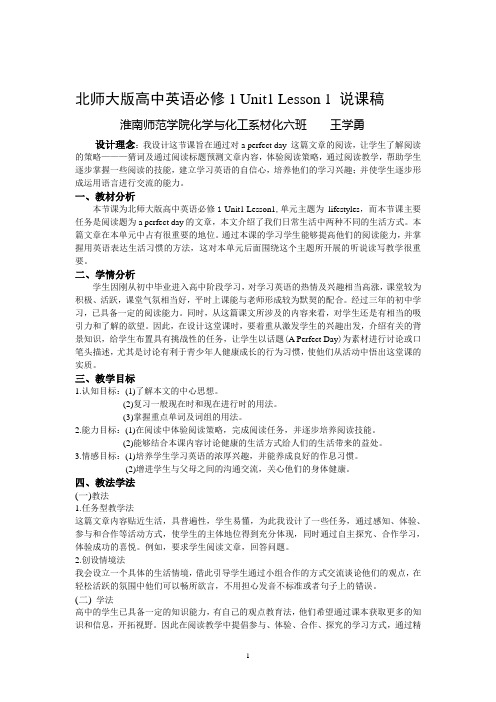
北师大版高中英语必修1 Unit1 Lesson 1 说课稿淮南师范学院化学与化工系材化六班王学勇设计理念:我设计这节课旨在通过对a perfect day这篇文章的阅读,让学生了解阅读的策略———猜词及通过阅读标题预测文章内容,体验阅读策略,通过阅读教学,帮助学生逐步掌握一些阅读的技能,建立学习英语的自信心,培养他们的学习兴趣;并使学生逐步形成运用语言进行交流的能力。
一、教材分析本节课为北师大版高中英语必修1 Unit1 Lesson1,单元主题为lifestyles,而本节课主要任务是阅读题为a perfect day的文章,本文介绍了我们日常生活中两种不同的生活方式。
本篇文章在本单元中占有很重要的地位。
通过本课的学习学生能够提高他们的阅读能力,并掌握用英语表达生活习惯的方法,这对本单元后面围绕这个主题所开展的听说读写教学很重要。
二、学情分析学生因刚从初中毕业进入高中阶段学习,对学习英语的热情及兴趣相当高涨,课堂较为积极、活跃,课堂气氛相当好,平时上课能与老师形成较为默契的配合。
经过三年的初中学习,已具备一定的阅读能力。
同时,从这篇课文所涉及的内容来看,对学生还是有相当的吸引力和了解的欲望。
因此,在设计这堂课时,要着重从激发学生的兴趣出发,介绍有关的背景知识,给学生布置具有挑战性的任务,让学生以话题(A Perfect Day)为素材进行讨论或口笔头描述,尤其是讨论有利于青少年人健康成长的行为习惯,使他们从活动中悟出这堂课的实质。
三、教学目标1.认知目标:(1)了解本文的中心思想。
(2)复习一般现在时和现在进行时的用法。
(3)掌握重点单词及词组的用法。
2.能力目标:(1)在阅读中体验阅读策略,完成阅读任务,并逐步培养阅读技能。
(2)能够结合本课内容讨论健康的生活方式给人们的生活带来的益处。
3.情感目标:(1)培养学生学习英语的浓厚兴趣,并能养成良好的作息习惯。
(2)增进学生与父母之间的沟通交流,关心他们的身体健康。
高一英语北师大版模块1_Unit_1_Lesson_1_A_Perfect_Day_教案___王静
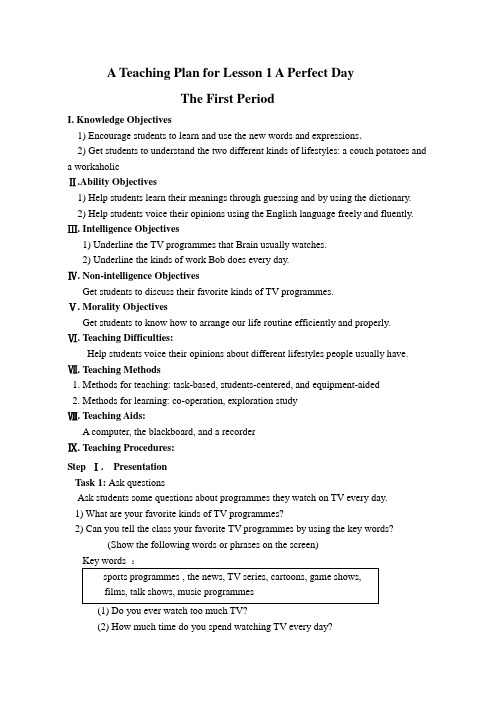
A Teaching Plan for Lesson 1 A Perfect DayThe First PeriodI. Knowledge Objectives1) Encourage students to learn and use the new words and expressions.2) Get students to understand the two different kinds of lifestyles: a couch potatoes anda workaholicⅡ.Ability Objectives1) Help students learn their meanings through guessing and by using the dictionary.2) Help students voice their opinions using the English language freely and fluently. Ⅲ. Intelligence Objectives1) Underline the TV programmes that Brain usually watches.2) Underline the kinds of work Bob does every day.Ⅳ. Non-intelligence ObjectivesGet students to discuss their favorite kinds of TV programmes.Ⅴ. Morality ObjectivesGet students to know how to arrange our life routine efficiently and properly.Ⅵ. Teaching Difficulties:Help students voice their opinions about different lifestyles people usually have. Ⅶ. Teaching Methods1. Methods for teaching: task-based, students-centered, and equipment-aided2. Methods for learning: co-operation, exploration studyⅧ. Teaching Aids:A computer, the blackboard, and a recorderⅨ. Teaching Procedures:StepⅠ. PresentationTask 1: Ask questionsAsk students some questions about programmes they watch on TV every day.1) What are your favorite kinds of TV programmes?2) Can you tell the class your favorite TV programmes by using the key words?(Show the following words or phrases on the screen)(1) Do you ever watch too much TV?(2) How much time do you spend watching TV every day?Task 2: Watch slidesWatch two pictures about the two men and answer the following questions:1. What are they doing?2. Why are they doing so?3. Do you want to know more about them?Today we will learn Lesson one : A perfect day(Write the topic on the blackboard).We will finish this lesson using two periods. In this lesson we will mainly do some comprehension. Next period we will focus on language use in texts.Step ⅡReadingTask 3: Get students to read the two texts quickly and encourage students to select the new words and expressionsTask 4:Help students learn their meanings by using the dictionaryTask 5:Get students to read the two texts quickly and do the following:1) Underline the TV programmes that Brain usually watches2) Underline the kinds of work Bob does every day.Step ⅢUnderstandingTask 6: Now read the texts again and answer the following two questions.1. What do you think of Brian? Can you find some examples of his character?2. What do you think of Bob? Can you give some details of his character?Step ⅣDiscussionTask 7: Discuss the following two questions.1. Are Brian and Bob’s lifestyles healthy?2. What can they do to improve their lifestyles?Step ⅤTalkingTask 8: Talk in pairs. The topics are as follows:1. Is your partner a “couch potato”, a“workaholic” or neither?2. What do you do at weekends?3. Do you often study at weekends?4. How to spend a perfect day efficiently and properly?Step ⅥReportingTask 9: Ask two students to report their ideas to the class.Step ⅦHomeworkToday we have read two texts about lifestyles. We have also talked about something about lifestyles. After class you should do the following:1. Read the text more to understand it better.2. Keep a 100 -word diary about your weekends.Reflection of the teaching designThis is a reading text which focuses on the language skills. I plan to finish it in two periods. In this period (the first) period, I pay the full attention to developing the students’ reading skills; teach them to use reading strategies to improve their reading effects. As to the related words, I use the modern slides to help the students to seize their meanings, and meanwhile encourage them to make sure of them in the context; the difficult sentences with functional grammar are arranged in the second period.Appendix:The Design of the Writing on the BlackboardLesson 1 A Perfect Day(The First Period)I. Find the information:The TV programmes Brain usually watches:The kinds of work Bob does every day:II. Read and think:Brain’s character:Bob’s character:III. Discussion:1.Are Brian and Bob'lifestyles healthy?2. What can they do to improve their lifestyles?IV. Homework1. Read the text more to understand it better.2. Keep a 100 -word diary about your weekends.。
高中英语 unit1 lesson1 a perfect day教学设计 北师大版必修1优选教学课件
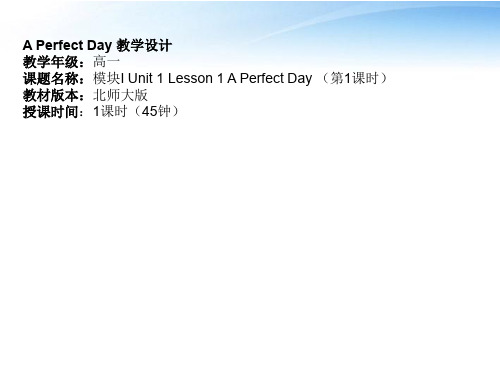
• 七.教学原则和策略
• 这节课的设计思路主要是运用《诱思探究教学论》中的“通过情景导入, 整体把握;理清思路,掌握课文”“局部探讨,由浅入深;层层推进,感悟 研究”的教学原则,和新课标所提倡的“以教师为主导,学生为主体”的教 学理念为依据,努力做到激发兴趣、激活课堂、激励上进。根据课文及学生 情况,并以学生的生活经验和兴趣为出发点,有明确的目,内容和方式尽量 真实,具有可操作性,在活动中能够促使学生获取、处理和使用信息,学生 通过思考、探究、讨论、交流和合作等方式,学习和使用英语,发展用英语 解决实际问题的能力,有利于学生学习英语知识、发展语言技能,从而提高 实际语言运用能力。在教学过程中,设计了让学生谈论自己父母的生活方式 和哪一种生活方式才是健康的生活方式,这一环节将本节课内容的语言输出 部分进行总结,来一个升华,这也是本节课应该出彩的地方。
• 四.教学重点与难点 • 1. Input the passages as a whole: make the Ss grasp and understand the
general idea of each passage as a whole. • 2. Language communication • A. Tell the main idea of the passages • B. Practice the main idea of the passages • C. Tell their own /their parents’ lifestyle. • 3. Thinking of the healthy lifestyles in our daily life and how to improve our
北师大版高中英语必修一Unit1-Lesson1-教学设计
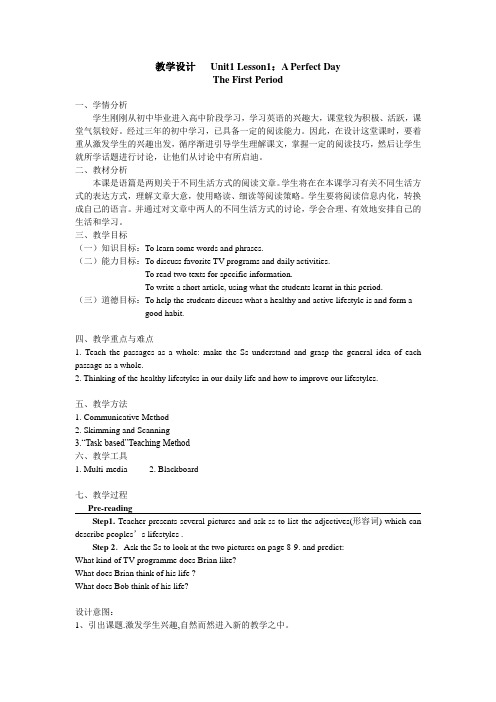
1.Read the text as much as possible and remember thenew words and phrases
2.Imagine you’re a friend of Bob or Brian, write a letter to advise him to improve his lifestyle.
Step2.Ask the Ss to look at the two pictures on page 8-9. and predict:
What kind of TV programme does Brian like?
What does Brian think of his life ?
What doesBobthink of his life?
Then get some of them to show their results of their discussion to the whole class.
设计意图:
这两部分是学生将课本信息转换成自己的语言的过程,引导学生用自己的语言谈论“什么是一个健康的生活方式?”培养学生的交际能力。这是对语言的进一步拓展。
教学设计Unit1 Lesson1:A Perfect Day
The First Period
一、学情分析
学生刚刚从初中毕业进入高中阶段学习,学习英语的兴趣大,课堂较为积极、活跃,课堂气氛较好。经过三年的初中学习,已具备一定的阅读能力。因此,在设计这堂课时,要着重从激发学生的兴趣出发,循序渐进引导学生理解课文,掌握一定的阅读技巧,然后让学生就所学话题进行讨论,让他们从讨论中有d answer questions about the passage “A Couch Potato”.
【教案】北师 必修一 Unit 1 Lifestyles Lesson 1 A Perfect Day

Unit 1 LifestylesLesson 1 A Perfect Day?一、教学目标1.熟记并使用sports programs, TV series, cartoons, workaholic, couch potato, talk show, switch on/off/over, complain about等词语或词组。
知晓以下两条谚语:All play and no work makes Jack a mere boy. (尽玩耍,不学习,再聪明的孩子也没出息。
);All work and no play makes Jack a dull boy. (只工作,不玩耍,再聪明的孩子也变傻。
)2.学生通过文章标题解读和略读,泛听和细读,理清文章的脉络。
采用寻读,提取和概括课文的表层信息,并根据表层信息就深层次的生活方式进行比较、对照、判断和选择;以思维导图的方式,结合已学文本,通过小组活动呈现一种身边不健康的生活方式并予以批判。
学习文本后,模仿架构,能写类似的作文。
3.会尊重、理解不同的生活方式,学会规划自己的学习、生活,选择健康向上的生活方式。
二、重点难点教学重点:1. 熟记并使用sports programs, TV series, cartoons, workaholic, couch potato, talk show, switch on/off/over, complain about, go off等词语或词组;2. 阅读课文并能通过寻读理解课文大意;3. 通过对比,理解、判断workaholic, couch potato两种不健康的生活方式。
教学难点:1. 学生英语听力速记能力的培养;2. 学生总结、提取文本架构能力的培养;3. 学生的仿写能力的培养。
三、教学过程步骤1:Step1 WARM UP ----A surveyBesides study, what do you usually do for fun?1.Group discussion.Each group makes a survey to see the popularity of the TV programs. While talking, you can use the expressions offered.Are you fond of...? Are you keen on...?Do you like/love...? What are your feelings about...?Do you find any pleasure in...? I’m crazy/mad about...I adore... I really enjoy... I do like...type of programsportsnewsTV seriesdocumentary(纪录片)cartoon(动画片)total numbertype of programgame show(游戏节目)filmtalk showentertainment(娱乐节目)total number2.Check the result of the survey by letting one or two students talk about their favorite TVprograms. 步骤2:Step 2 READING1.Before reading, remind the students of the title of the text: Why is there a question mark with the title?2.Brief introduction to Brian Blakey and Bob Black.3.Listening Practice.Task1.While listening to Part1, Ss take down in shorthand the TV programs that Brian usually watches.Task 2.While listening to Part2, Ss take down in shorthand the kinds of work Bob does every day.4.Ss read the text and answer the following questions:1) Is Brian a lazy person? Can you find 2 examples of his lazy behavior?(Yes, Brian is lazy. For example, h e watches the children’s programs until about half-past ten. Then he gets up. He doesn’t work but his wife works and she makes his meals.)2)Why does Bob work so hard?(He wants to make more money. Besides, he gets bored if there is nothing to do . He likes being busy.)3)How did the author organize the text?(In the order of time and place.)4)Conclude the general idea of each paragraph.A couch potatoPara1:Addiction to TV programs all day long.Para2:Do some exercise---walk dog with portable TV.Para3:A helping wife. Not much money, but happy. World in hand. Great!A workaholicPara1:Rush to workPara2:Urgent work all day longPara3:Still work after workPara4:Not enough time for fun and family, but for money. Like being busy.5)What do the couch potato and the workaholic have in common?(They all lead an unhealthy way of life, Brian watches TV all day long without doing nothing else, while Bob works almost around the clock to make more money for his family without enough rest.)6)Compare these two lifestyles.A couch potato → All play and no work makes Jack a mere boy.A workaholic →All work and no play makes Jack a dull boy.Conclusion: We make a conclusion that we should lead a balanced life. We should try to alternate work with rest and recreation. So, the author shows his attitude that he is not for these two unhealthy lifestyles by putting a question mark with the title.7)Can you find a same lifestyle that your friend is now leading?(①a phubber;②a studyaholic)步骤3:Step3 COMPOSITION FRAMEWORKStructure of the text描述……的一天(时间、地点、做何事);概述……的喜恶;综述……的生活给家人的感受。
a-perfect-day教案.doc.

a-p e r f e c t-d a y教案.d o c.-CAL-FENGHAI-(2020YEAR-YICAI)_JINGBIAN高中英语课堂教学设计Unit 1 LifestylesLesson 1 A Perfect Day[教材分析]本课为北师大版高中英语必修一第一单元第一课。
本单元主题为lifestyles”,而本节课主要任务是阅读题为A Perfect Day的文章,本文介绍了我们日常生活中的两种不同的基本生活方式---懒人生活和工作狂生活。
本课时是本单元的第一课时,课型是阅读型课,也希望通过对这节课的学习能够启发学生应该拥有健康的生活方式和如何拥有健康的生活方式。
本篇文章在本单元中占有重要地位。
通过对本篇文章的学习,学生能够提高他们的阅读能力,并掌握如何用英语表达生活习惯,这对本单元后面围绕这个主题所开展的听说读写很重要。
[学情分析]他们是刚刚升入高中的学生,因为三年的初中基础,他们已经具有一定的英语语言基础和思辨能力,绝大多数同学对英语学习兴趣较为浓厚,好奇心及学习动机也比较强。
但是,在英语口语交际能力方面,由于英语口语基础薄弱,课上又害怕开口说英语,缺乏自信心,所以口语交际能力相对较弱,因此教师应当时刻鼓励学生利用每个机会说英语,以达到锻炼口语的目的。
另外,高一学生对于阅读策略如skimming and scanning的运用还很欠缺,老师需要充分利用课堂时间对此进行针对性的指导和训练[教学目标]根据新课标的课程理念,我从知识与能力、过程与方法、情感态度价值观这三个方面确立以下三个目标:1、知识与能力目标::让学生学习并掌握本课的重难点词汇及词组;让学生掌握skimming and scanning这种阅读技能,让他们能够快速从文章中提取有效信息;让学生通过对本文的学习能够运用所学语言知识用自己的话描述他人或者自己的生活方式。
2、过程与方法目标:通过感知、品悟、探究、拓展等活动过程提高学生创造性思维能力和口语表达能力,培养学生学习能力;通过自主学习、合作交流,体会自主与合作的过程方法。
英语北师大版必修1全套教案

Unit 1 A Perfect DayTeaching aims:To read two texts for specific informationTo revise Present Simple and Present ContinuousTeaching course:ⅠWarm upFirst ask students the question to arouse their interest.What do you think a perfect day is like?Students will give all kinds of answers: go shopping ; watching TV;read novels;listen to music; surf the Internet and so on.Draw a conclusion:do all you like to do; live a life in the way you like。
Now read two texts telling you two people’s perfect day s。
ⅡReadingUnderstanding the textRead the text and answer the following questions。
What kind of lifestyle do you think the man in a couch potato?Do you ever watch too much TV?How much time do you spend watching TV every day?What kind of lifestyle do you think the man in the second text?Listen to the text1.underline the TV programmes that Brian usually watches。
北师大版英语必修一unit 1教案
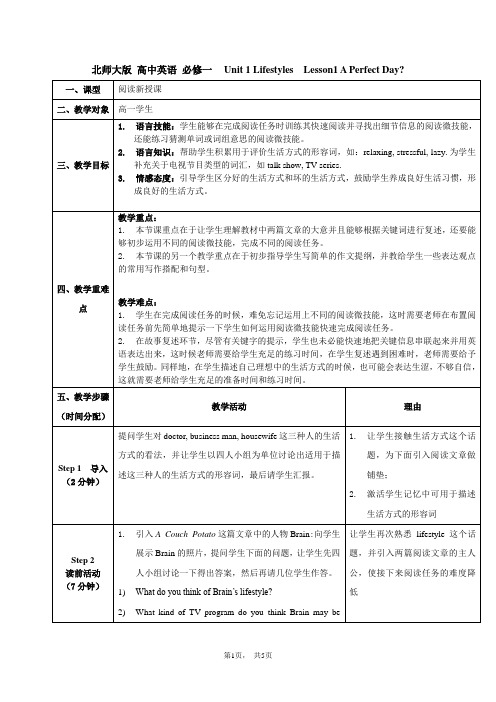
北师大版高中英语必修一Unit 1 Lifestyles Lesson1 A Perfect Day?一、课型阅读新授课二、教学对象高一学生三、教学目标1. 语言技能:学生能够在完成阅读任务时训练其快速阅读并寻找出细节信息的阅读微技能,还能练习猜测单词或词组意思的阅读微技能。
2. 语言知识:帮助学生积累用于评价生活方式的形容词,如:relaxing, stressful, lazy.为学生补充关于电视节目类型的词汇,如talk show, TV series.3. 情感态度:引导学生区分好的生活方式和坏的生活方式,鼓励学生养成良好生活习惯,形成良好的生活方式。
四、教学重难点教学重点:1. 本节课重点在于让学生理解教材中两篇文章的大意并且能够根据关键词进行复述,还要能够初步运用不同的阅读微技能,完成不同的阅读任务。
2. 本节课的另一个教学重点在于初步指导学生写简单的作文提纲,并教给学生一些表达观点的常用写作搭配和句型。
教学难点:1. 学生在完成阅读任务的时候,难免忘记运用上不同的阅读微技能,这时需要老师在布置阅读任务前先简单地提示一下学生如何运用阅读微技能快速完成阅读任务。
2. 在故事复述环节,尽管有关键字的提示,学生也未必能快速地把关键信息串联起来并用英语表达出来,这时候老师需要给学生充足的练习时间,在学生复述遇到困难时,老师需要给予学生鼓励。
同样地,在学生描述自己理想中的生活方式的时候,也可能会表达生涩,不够自信,这就需要老师给学生充足的准备时间和练习时间。
五、教学步骤(时间分配)教学活动理由Step 1导入(2分钟)提问学生对doctor, business man, housewife这三种人的生活方式的看法,并让学生以四人小组为单位讨论出适用于描述这三种人的生活方式的形容词,最后请学生汇报。
1.让学生接触生活方式这个话题,为下面引入阅读文章做铺垫;2.激活学生记忆中可用于描述生活方式的形容词Step 2 读前活动(7分钟)1.引入A Couch Potato这篇文章中的人物Brain:向学生展示Brain的照片,提问学生下面的问题,让学生先四人小组讨论一下得出答案,然后再请几位学生作答。
高中英语北师大版模块1【教学设计】Unit1 lesson1 A Perfect Day
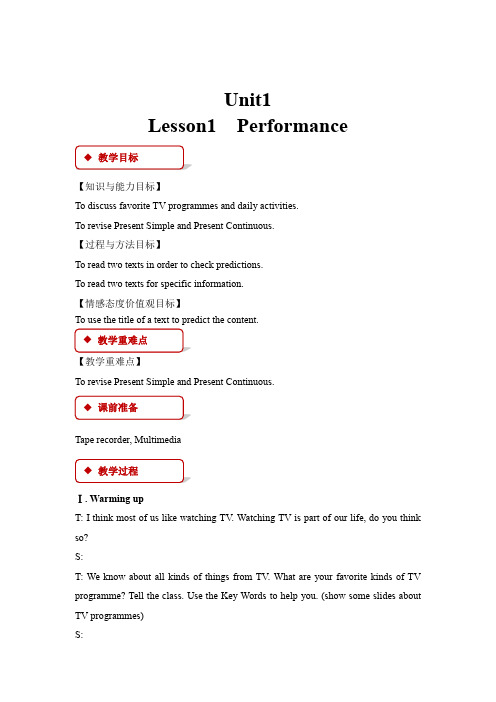
Unit1Lesson1 Performance【知识与能力目标】To discuss favorite TV programmes and daily activities.To revise Present Simple and Present Continuous.【过程与方法目标】To read two texts in order to check predictions.To read two texts for specific information.【情感态度价值观目标】To use the title of a text to predict the content.【教学重难点】To revise Present Simple and Present Continuous.Tape recorder, MultimediaⅠ. Warming upT: I think most of us like watching TV. Watching TV is part of our life, do you think so?S:T: We know about all kinds of things from TV. What are your favorite kinds of TV programme? Tell the class. Use the Key Words to help you. (show some slides about TV programmes)S:T: Why do you like the programmes?S:T: Do you ever watch too much TV? How much time do you spend watching TV every day?S:T: The way a person lives and works is different. Can you imagine an adult does nothing except watch TV all day? Or he only thinks of working and never has time to watch TV? What kind of lifestyle do you think the men in the picture have?S:T: In reality few people like do that, but some people like that lifestyle and think it is a perfect day. Now let’s read the text “A Perfect Day?” really?ⅡReadingDo the exercise true or false to see how much students understand.1.Brian is not satisfied with the kind of lifestyle.2. Brian’s wife goes out to work and supports the family.3. Bob is poor so he has to work day and night.4. Bob almost has no time to spent with his family.5. It seems that Bob prefers doing a lot of things all day to doing nothing.6. Bob’s wife often quarreled with Bob for him doing nothing.7. Brian has more than a TV set.8. Brian ‘s wife often complains the money that Brian makes is not enough. Answers: 1. F 2.T 3. F 4. T 5. T 6.F 7.T 8.FT:What does a couch potato refer to?S:T: A couch potato is someone who watches lots (some would say too much!) of television.“沙发马铃薯”。
英语北师大版必修1全部资料课程教案
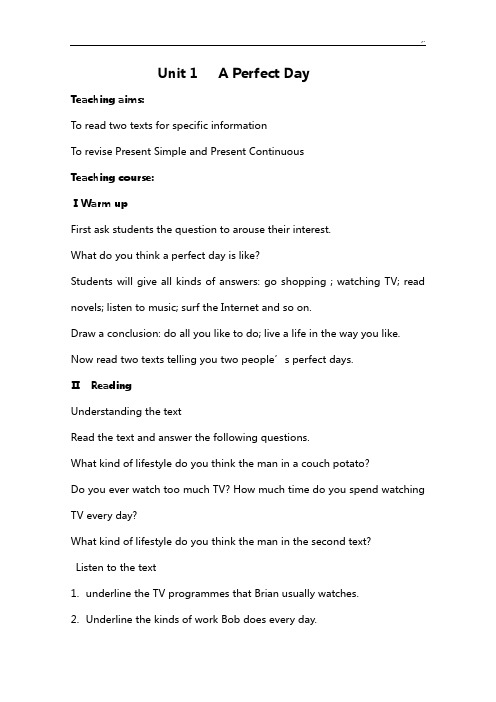
Unit 1 A Perfect DayTeaching aims:To read two texts for specific informationTo revise Present Simple and Present ContinuousTeaching course:ⅠWarm upFirst ask students the question to arouse their interest.What do you think a perfect day is like?Students will give all kinds of answers: go shopping ; watching TV; read novels; listen to music; surf the Internet and so on.Draw a conclusion: do all you like to do; live a life in the way you like. Now read two texts telling you two people’s perfect days.ⅡReadingUnderstanding the textRead the text and answer the following questions.What kind of lifestyle do you think the man in a couch potato?Do you ever watch too much TV? How much time do you spend watching TV every day?What kind of lifestyle do you think the man in the second text?Listen to the text1.underline the TV programmes that Brian usually watches.2.Underline the kinds of work Bob does every day.ⅢSpeakingDo the exercise 4Read the two texts again and answer these questionsDo the exercise 5Which lifestyle do you prefer? Which one is healthier? What can Bob or Britain do to improve their lifestyles?What does a couch potato refer to?What does a workaholic mean?ⅣLanguage in useWork in pairs and describe your parents’lifestyle to your partner.ⅤVocabularyDo the exercise 7ⅥGrammarFirst turn to page 92 analysis and explain Present Simple and Present ContinuousThen do the exercise 8 and 9ⅦHomeworkWrite a composition “My Perfect Day”Words:100 words or soSuppose you can design your a day freely what is your perfect day like?Unit1 Lesson 2 RelaxingTeaching aims:To practise listening for specific informationTo learn about ways of dealing with stress in everyday lifeTeaching course:ⅠWarm upWork is very important in our life. We have to work, no matter what you are. With the development of modern society, people are fastening their steps of life. There is less time for relaxation. The problem is that more and more people feel stressed. How to get rid of the stress we are suffering from is what we are to talk about.ⅡTalkingTask oneYou are to do some listening, Before it think about your school life, list the things ( at least 3 ) you do and your feeling about them. ( A=Activity, F=Feeling )(目的是激发学生的兴趣,锻炼学生的口头表达能力,为听力内容做铺垫)How do you get rid of the stress in your life?Talk to each other about the activities you have listed. Say which is stressful and which is relaxing. Do it like this:prepare for an exam; lie on the beach; wait for the result of; give a talk in English; do shopping with task two.Interview your classmates to see what kind of stress they are suffering from and how they relax themselves or get rid of it.ⅢListeningDo the exercise 2Do the exercise 3Read through the Strategies with the class and see if they can use any of these Strategies already.In pairs, students read the questions and try to predict the answers. Point out that morethan one answer is possible.Students then exchange ideas to find out if they have made the same predictions if they have made different predictions, ask students to justify their opinions.Do the exercise 5 and 6Before listening the materials ask students to read the questions and first predict answers then listen the tape twice.When students have checked their answers, ask them what advice they would give to Mark to help him be less nervous before exams and before going to parties.Do the exercise 7Students look at the exercise and see if they can remember or can guess any of the missing words.Students listen to the cassette again and complete the sentences in the Function File. PronunciationDo the exercise 9In our oral language we often pause. Now listen to Mark again. Which words orsounds does he use to hesitate?Students listen to the cassette. After each sentence, pause the cassette so that students can repeat the hesitation device.Do the exercise 10Before starting their talk, students can look at the sentences they wrote in Exercise 9 Students then put the exercise away and talk to their group without any notes, using as many hesitation words as possible.ⅣHomework:Writ a report about you interview in class. Write about the stress you and most of your classmates are suffering from. Find the causes of the stresses and give advice on how to relax yourselves.Lesson 3 A Volunteer TeacherTeaching aims:To listen for specific factsTo give opinion about voluntary workTo talk about future arrangements and intentions, using the Present Simple, the Present Continuous and going toTeaching difficulties:To talk about future arrangements and intentions, using the Present Simple, the Present Continuous and going toTeaching Aids: computer and cassetteTeaching procedures:Ⅰ. SpeakingT: What does the girl do?S:T: Yes she is a volunteer teacher. This is a real story. The girl’s name is Wang Shu, grew up in Hangzhou, Zhejiang Province. Upon graduation from the English department of Beijing Normal University, she left Beijing for Inner Mongolia working as a volunteer teacher. She is still there now. What do you know about this part of China?S:T: show a slide to introduce Inner Mongolia (Inner Mongolia (Nei Mongol) is the first national autonomous region established in China. It stretches along China's northern border with Mongolia and Russia and covers an oblong area of over 1.28 million square kilometers, one eighth of China. Of all the Chinese provinces and autonomous regions, Inner Mongolia is the third largest after Xinjiang and Tibet.) Inner Mongolia falls behind developed areas so it needs volunteers go to work there.T:What can you say about the girl in the photo?S:ⅡListeningStudents read the questions and predict the answersT: I think you must be interested in Wang Shu, now listen to the interview,you will learn more about her and answer these questions.Students listen to the tape and check their predictions.Students listen to the tape again and make sure of the answers Students work in pairs and take turns to retell Wang Shu’s storyⅢVoice your opinionIs it a good idea to do voluntary work? What reasons do people have for doing voluntary work?ⅣVocabularyDo the exercise 5.Students work individually, thinking about the cues and what they are going to do.Students read the sentences, decide which words to use, and then complete the sentences.ⅤGrammarDo the exercise 6Listen to the interview again. Pay attention to these sentences from the interview. What verb forms are used to talk about the future?Guide students to draw the following conclusion:present Simplepresent Continuousgoing to + infinitivedo consolidate exercise7, 8and 9explain further grammar:Expressing future arrangements and intentions:be going to-- to express an intention to do something.Present Continuous-- to talk about future events that we have already fixed or arranged.Present Simple-- to talk about official events or timetables which we cannot change.be going to do 与be doing 的区别be going to do 表示事先经过考虑过,然后计划好将做某事;迹象将发生某事。
- 1、下载文档前请自行甄别文档内容的完整性,平台不提供额外的编辑、内容补充、找答案等附加服务。
- 2、"仅部分预览"的文档,不可在线预览部分如存在完整性等问题,可反馈申请退款(可完整预览的文档不适用该条件!)。
- 3、如文档侵犯您的权益,请联系客服反馈,我们会尽快为您处理(人工客服工作时间:9:00-18:30)。
福建省北京师范大学泉州附属中学北师大版高一英语《Unit1 Lesson1 A
Perfect Day (2)》教案
Teaching procedures
Step1. Warm-up
1. What kind of lifestyle does Brain have?
2.What is the man doing i n the picture? And his name?
3.What kind of lifestyle do you think the men in the picture have?
Step4. While-Reading
I. Fast—Reading: Read the text quickly and finish the following exercises
1. Match the topic with each paragraph
Para1 I am busy at day.
Para2 I’m also busy at night.
Para 3 I go to work quickly
Para 4 Why am I so busy?
2. Write down the Work that Bob does every day..
Time Bob
Morning
Afternoon
Evening
Late at night
II. Careful-reading :Read the text carefully and finish the follo wing exercises
1. Fill in the blanks
Time Brian
In the morning I wake up before my alarm clock __________. _________ I hear my alarm clock,
I __________ bed. And then I ________, have breakfast and leave home.
I am the first person ___________ the office.
In the afternoon Meetings and phone calls _________________ a large part of the day. Every mi nute of the day is _________ urgent matters.
In the evenings By around 8 o’clock, I do my own _________ and answer some ____________ e-mail.
At about ten, I looked at some __________ that I bring back from the
office.
Late at night I get to bed around ____________.
III. Understand the text(二)
1.Why does Bob’s family complain?
___________________________________________________________________
2.Why does Bob work so har d?
___________________________________________________________________
Step5. After-reading:
1. Read and find the similarities between Bob and Brian
___________________________________________________________________
2. Which lifestyle do you prefer? Which one is healthier?
3. What can Bob or Brian do to improve their lifestyles?
___________________________________________________________________
___________________________________________________________________
Step6 Useful Phrases
1.打开___________
2.此刻___________
3.转台___________
4.关闭___________
5.做运动___________
6.做饭___________
7.(铃)响___________ 8.一。
据。
___________
9.换衣服___________
10.占据,从事___________
11.充满___________
12.紧急事件___________
13.抱怨___________
14.无聊___________
Step7. Homework
1. 全品导学案练习III(第2个表格).预习全品导学案
2. Dictation。
